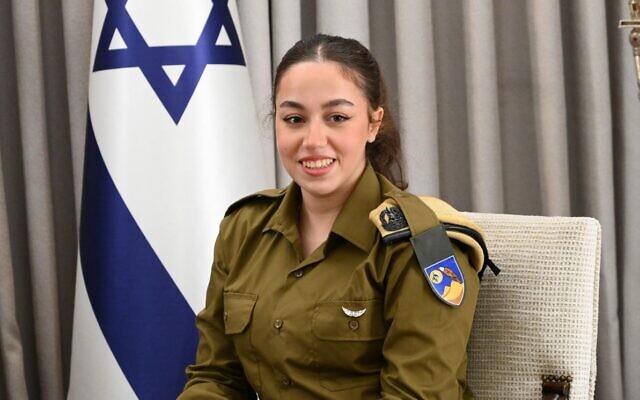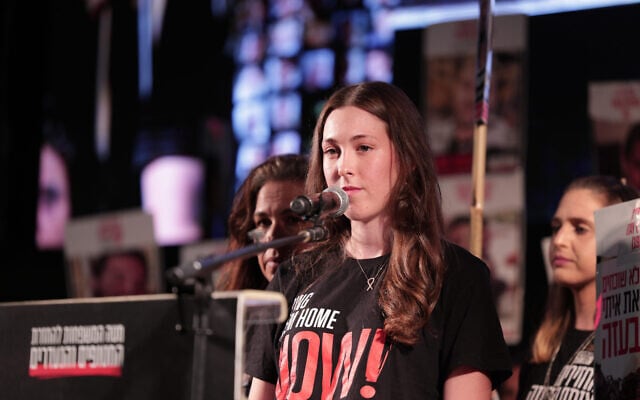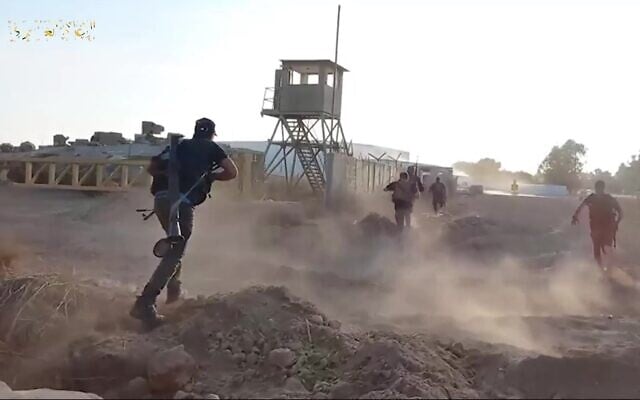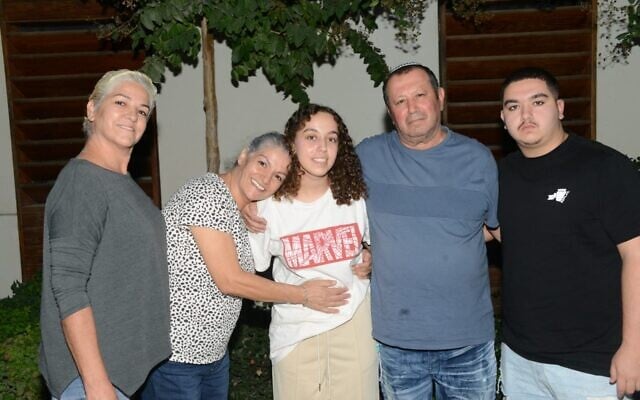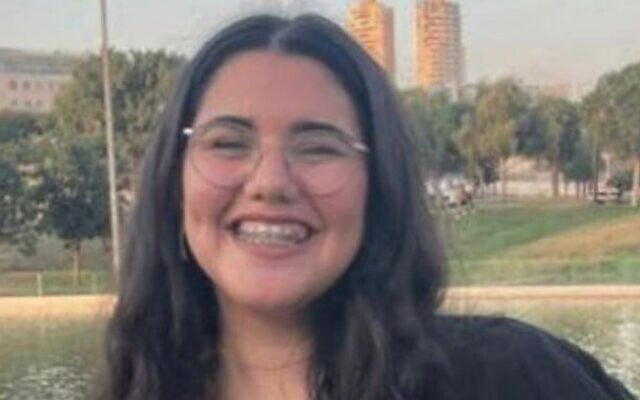


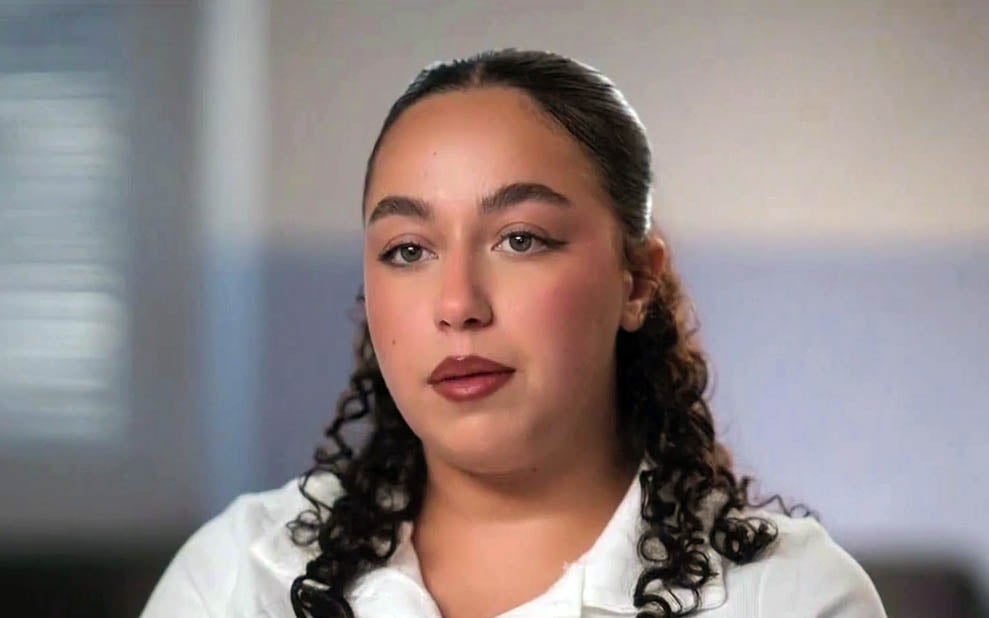
For the first time, Ori Megidish, an Israeli soldier who was the first hostage to be rescued from the Gaza Strip following the Oct. 7, 2023, attack, has spoken about her experiences, including sexual harassment by a Hamas guard, nearly dying in an airstrike, and being treated by doctors at a Gaza hospital.
Megidish spoke to Channel 12 news in a pre-recorded interview that was broadcast on Wednesday night, as the families of hostages remaining in Gaza marked 600 days since the devastating Hamas attack in which they were abducted.
“The whole 23 days I feared I would die,” Megidish said of the period until she was rescued. “It never left me for a moment. It is a fear you can’t describe.”
Megidish was abducted from the Nahal Oz Base by Hamas gunmen. In total, 66 soldiers were killed in Hamas’s assault on the base, and several others were taken hostage.
During the assault, Megidish said that she and others took refuge in a bomb shelter at the base. Hamas terrorists who overran the base then threw a grenade in.
When she looked up, she saw another female soldier, whom she didn’t know, still in pajamas, on her knees and firing back at the terrorists.
“She is my hero,” she said.
According to Channel 12, that soldier in question was Cpt. Eden Nimri, 22, who positioned herself at the entrance to the shelter and fought back against the attackers. Nimri was eventually killed, as were many others inside the shelter.
Megidish said some 30 to 40 terrorists entered the shelter in a state of “euphoria,” smiling at the soldiers huddled there.
“I will never forget their smiles,” she said. “I don’t even remember what they looked like, but I remember that they smiled. They looked at us and decided who lives and who dies.”
Making what she called “a mistake,” she made eye contact with one of the terrorists, who then took her away, forcing her into a vehicle. Unknown to her at the time, in the back of the same car was her good friend, Noa Marciano.
Another soldier, Naama Levy, was also forced into the vehicle. The three were then driven into Gaza, where Megidish and Levy were separated from Marciano.
Megidish was taken to an apartment. Among her guards, one in particular, whom she dubbed “the boss,” was particularly disturbing.
“He didn’t look at me the way a normal person does,” she said, and then described how the terrorist would touch intimate parts of her body whenever he passed.
Recalling that she was injured in her chest, she said the man would also show interest in the wound “in order to take a look.”
Under the circumstances, she said, she was unable to oppose his advances.
She said that at first she did not think about it too much, but that months later, “I came to terms with the fact that it was sexual harassment and I suffered that, and it is not an embarrassment.
“I know that I am not to blame, that I couldn’t prevent it,” she said. At the same time, she admitted that she asks herself, “What if I had done this or that. God only knows what would have happened if we were in that apartment for longer.”
Like other hostages who have returned, Megidish spoke of her fear in captivity that she would be killed in an Israeli airstrike. On her third Saturday in Gaza, a bombing caved in the roof of the apartment where she was imprisoned, setting the house on fire and killing one of the guards. Megidish suffered a fractured skull.
The “boss” took her from the apartment to a nearby hospital, by which time she was starting to lose her balance. “The whole room spun,” she said.
A doctor, speaking to her in English, explained he would sew up her head and face, and then proceeded to do so without giving her any anesthetic.
“It was indescribable pain,” she said, and recalled that the hospital staff told her to keep quiet and not scream.
After a night at the hospital, she was taken by other terror operatives to another apartment. Her captors told her that if Israeli soldiers tried to rescue her, they would kill her, leaving her terrified of a potential rescue operation.
But a rescue did come, in the early hours of October 20, while she was asleep.
“I heard shooting, and I realized that something was happening,” she said, and described how she hid behind a fridge, sitting curled up and with her hands over her ears.
“I shouted in Hebrew, I don’t know why, but I felt it was a rescue,” she said.
Then a man, who she described as looking just like a local, stood before her.
“It could have been someone who came to abduct me, but I went with him. He took me, and we ran,” she said.
They reached a vehicle and drove away. Inside, the men spoke to her in Hebrew. The soldier who had brought her to the car began to check her to see if she was injured or harmed.
“I remember that I exchanged a look with him, and I saw how emotional he was. Only after I came back and got used to things a bit did I understand that for the people who rescued me, it was, finally, a moment to breathe after this [difficult] period.”
Megidish is still not permitted to discuss some details about the rescue, the network noted.
Since her return, Megidish spends a lot of time at home, building Lego projects. She explained that as a naturally shy person, she was uncomfortable with all the attention she would get outside, well-meaning though it would be.
She has also faced a range of false rumors, she said, among them a claim that she had come back from Gaza pregnant.
“That irritated me. I know what is true and what isn’t,” she said.
Megidish also described how difficult things were for her after she returned, knowing that her friend, Marciano, was still in Gaza.
“I looked forward to her returning so that we could talk about things,” she said.
However, that would not come to pass.
The IDF has said that Marciano was wounded by an IDF airstrike on November 9, while held in Gaza, and later taken to Shifa Hospital in the Strip, where she was murdered.
“From what I understand, [the strike] really hurt her, and it was hard for her, and the doctors simply decided to end her life,” Megidish said.
“We have a quite similar story, but her ending was different. It really bothered me at first — why was her ending like that, and mine like this?”
On November 14, 2023, the army declared Marciano dead, and on November 16, they announced that they had recovered her body and brought it back to Israel. She was laid to rest in Modiin on November 17.
Over a year later, on January 25, 2025, Naama Levy, 20, was released from Hamas captivity in Gaza as part of a ceasefire-hostage release deal.
Terror groups in the Gaza Strip are holding 58 hostages, including 57 of the 251 abducted by Hamas-led terrorists on October 7, 2023.
They include the bodies of at least 35 confirmed dead by the IDF, and 20 are believed to be alive. There are grave concerns for the well-being of three others, Israeli officials have said.

